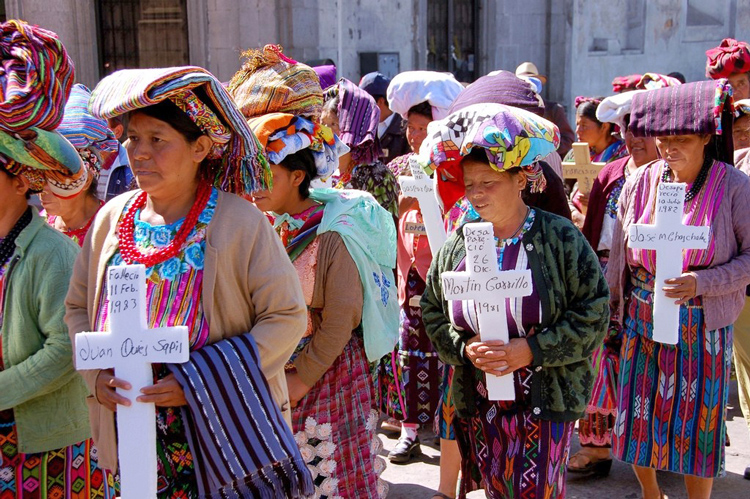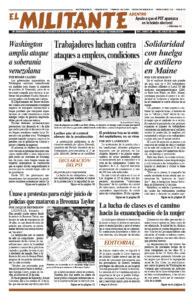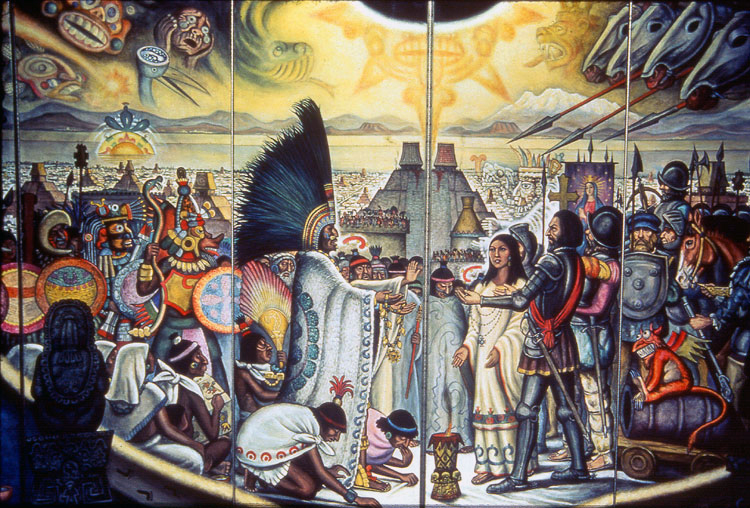Over the Fourth of July weekend, a statue of Italian-born seafarer Christopher Columbus, the first European to discover the Americas in 1492, was pulled down and thrown into the Baltimore harbor. Another, presented by Italian-Americans to the city of Waterbury, Connecticut, was beheaded. In Buffalo, New York, and Columbus, Ohio, statues were removed to stop vandals from getting to them. Those who destroyed the statues argued that there was nothing to celebrate about Columbus opening the Americas to Europe.
The two interrelated articles below from the Nov. 8, 1991, issue of the Militant are relevant and helpful today in discussing the importance of Europeans finding the link to the Americas. The first is an interview with one of the historic leaders of the Cuban Revolution, Armando Hart, entitled “Faithful to the Universality that Inspired the Navigators in 1492,” reprinted from the February 1991 Granma Weekly Review on the occasion of the 500th anniversary of Columbus’ first sighting of the Americas.
As part of marking this event the Cubans erected a memorial statue titled “Encuentro” on the coast of the Bay of Bariay in Holguín province, where Columbus first landed. On a later voyage, he made the first European discovery of the South American continent. These discoveries opened up a door to the advancement of human history as well as a stage of brutal colonial exploitation.
The second article, “A Scientific Approach to Opening of ‘New World,’” by George Buchanan, further explains the history that Hart discusses.
❖
“The great geographical discoveries of the 15th and 16th centuries were historic, but they must be distinguished from the conquest, although the two events were interrelated in practice. The Europeans came with the desire to find new worlds — to discover them for themselves, of course, because these lands were already well known to the indigenous peoples — and above all, with the desire to prove that the world was round. But the Spanish feudal classes took control of the discovery and began to loot, steal and violently carry out the conquest,” observed Armando Hart, Cuban minister of culture, in an exclusive interview with Granma Weekly Review.
“I think that we haven’t had sufficient distance to evaluate the great discoveries of Christopher Columbus and those who came later. I’m referring not to the ‘discovery’ of a continent but rather the discovery of what I have called ‘the roads of the world,’ that is, the route to America and the world, which is something that opened up the way for progress. After the voyages by Magellan and other navigators, it could almost be proved that the earth was round, and the world began to be perceived for what it really is. But this great achievement of the discovery was clouded from the very beginning by the shameful and enormous crime of the conquest.”
GRANMA: Why do you say that the retrograde forces in Spain at the time took advantage of the discovery of America?
HART: The Europeans made these discoveries in order to expand trade and the known world. These events, in and of themselves, were revolutionary events that extended human culture into a dimension unknown until that moment. Since the fall of the Roman empire, 1000 years before, nothing of that magnitude had taken place. Actually, it’s hard to find a more significant event before 1492, and after that date it is comparable to the splitting of the atom and the possibilities for controlling energy unleashed by that accomplishment.
But the feat of the discovery, fueled by nascent European capitalism with its goals of economic expansion, was blemished by unbridled pillage, the essence of the conquest which followed. While the discovery of America signified progress, the conquest was one of the darkest and most shameful stages in the history of humanity.
Those who came to America after the European discoverers, employed methods that were backward in comparison to the capitalism opening up on the old continent. They were methods of physical conquest; they weren’t methods of merchants, nor did their violent irruption into the Americas signify any trade opening. They came in search of the gold and riches of the indigenous people; they annihilated the material and spiritual progress of the native peoples and the dire consequences rebounded back to Spain, blocking the arrival and consolidation of the bourgeois system.

GRANMA: Could we conclude that Spain’s achievement of the discovery ultimately was not beneficial to Spain?
HART: Columbus was a great figure whom I admire, and his voyage promoted the search for new trade routes and, as I said, the confirmation of the notion that the world is round, first explored during ancient times. But the reactionary Spanish classes at that time and the centuries to follow attempted, through the annihilation of the cultures and people of the Americas, to consolidate their essential interests and brought about a great retrocession which was the most disastrous for Spain. The conquest and colonization was carried out with precapitalist methods and forms, and as a result bourgeois development was delayed for centuries.
Events such as the English Industrial Revolution or the French Revolution of 1789, with all its influences and consequences, did not take place in Spain. That is because the continent discovered by the Europeans, which was already well known to its original inhabitants, who had gone there from Asia, helped the existing feudal system to crush or hold back the seeds of the bourgeoisie that were sprouting up at the end of the 15th century, the same seeds that had sparked interest in navigation and the search for the sea route to the Indies starting in the middle of that century, and especially as of the occupation of Constantinople by the Turks in 1453.
Spanish society became wealthy as a result of the conquest of the Americas, including the discovery of huge deposits of precious metals. The booties were highly coveted and financed the luxuries of the courts and other superfluous expenses. This helped finance the British accumulation of wealth and the rampant development of capitalism there, to the detriment of Spain, which was held back for centuries.
Thus the enlightenment of the bourgeois regime on the [Iberian] Peninsula was delayed for almost five centuries, because it wasn’t until the last 40 years that a bourgeois democratic process began to take place there. Previously there were attempts, efforts were made, but Spain did not become a classic bourgeois society until the present day.
GRANMA: This was a tragic delay which had negative consequences for Spain and other peoples, particularly in the Americas.
HART: That backwardness, that lack of progress, was a result of the conquest but it was not the only one. The conquest had three serious consequences: the strategic backwardness in Spain; the annihilation of the indigenous peoples and cultures; and African slavery. These last two phenomena cannot be accepted or justified in any way, today or ever, and we must reject them wholeheartedly. This is an ethical problem which is still valid today.
If we are able to separate the revolutionary event signified by the Europeans’ great geographical discoveries half a millennium ago from the conquest and the colonization by the Spanish feudal class, we can interpret the history of these 500 years in a scientific and beneficial manner.
GRANMA: You framed the results of the conquest in current ethical terms, but what about the human aspect in those early centuries?
HART: The conquest which followed the discoveries exterminated the Indian population in various countries, brutally altering the way of life there and imposing intense regimens of exploitation, disease and helplessness, and almost from the beginning it brought in African slaves, expanding the slave trade to an appalling extent. These atrocities were maintained for centuries and must be condemned today, and must certainly never be forgotten. We must understand and recognize the meaning of the holocaust perpetrated over several centuries, based on elemental moral principles.
We cannot praise the positive and beautiful aspects of the feat achieved by those early navigators without repudiating the conquest. This is how we can be faithful to the universality that inspired the sailors in 1492 and the highest humanist postulates of civilization. Of course, one could argue that history had to happen that way and that history has its laws. But you could also argue that human beings have a moral conscience, an ethical conscience, and for that reason we hate the Roman emperors who took the Christians to the coliseum to be clawed to death by the lions and we admire Spartacus.1
I don’t think we could admire the example of Father Bartolomé de Las Casas2 without repudiating Pizarro,3 whose actions still weigh dramatically on Peruvian society; he caused profound splits among the population, Indians and Spaniards, and caused traumas which persist in that country.
We are now preparing to hold a dignified commemoration of the fifth centennial of those voyages, of the discovery of the roads of the world, and we are happy to do so if such a commemoration can serve to denounce the conquest, at least morally, because today we face modern conquerors who are no less retrograde than the ones 500 years ago.
GRANMA: You are asserting the current validity of those historical circumstances of 500 years ago. Could you be more explicit?
HART: History tends to repeat itself, interestingly enough, although today’s conquerors are different. We must prevent the retrograde classes from taking control, once again, of the great scientific discoveries in order to crush or subjugate humanity. This is a practical as well as a moral problem which offers great lessons today.
In our world, indigenous populations exist which have witnessed the destruction of their cultures. This cannot be forgotten. Often the reactionary classes today take control of the technical achievements, just as the Spanish feudal class did with the geographical discoveries, to the detriment of the bourgeois thinking which had fostered them, and they are trying to consolidate and expand their control now, in the modern world.
The great scientific advancements, the great discoveries have in many cases been taken over by the reactionaries, in the arms race and terrorizing the world through imperialism, all of which does nothing to help the impoverished masses of the planet. Today the imperialists want to conquer and crush us with technological development, based on their control of such research and its results. The U.S. military-industrial complex, for instance, which is about as up-to-date as you can get, utilizes atomic energy, electronics and other branches of science for terror and death.
GRANMA: And if Spanish society, which had to suffer that outrage for so long, did not understand it, how do you think that today’s world can evaluate the new and no less critical usurpation?
HART: They say that Einstein died a sad man. No one can deny his grandeur and his extraordinary talent; his great discoveries were utilized to create nuclear explosions and for other very harmful experiments. Such contradictions exist in history and we must learn from them. I don’t know whether today’s world has a large enough moral conscience and enough education to become aware of the magnitude of this phenomenon and to denounce the modern conquerors.
The essence of the problem is that with each scientific achievement in the history of man there is a dramatic dichotomy: the possibility for enormous progress in human liberation, on the one hand, and the interests of the decadent classes, on the other, which use the achievement to maintain their control. This is the lesson we must learn, and we can gain significant experience from what happened 500 years ago and the centuries that followed.
Medieval obscurantism and reactionary interests in Spain overshadowed the prestige and authority of the great discoveries made by Christopher Columbus. The looting and despoiling of the indigenous peoples had that result and characterized one of the darkest stages in human history.
Of course, there is still much to study in that process of the conquest and colonization; among other reasons, because the Latin American peoples emerged out of that process. Once some Spaniards reminded me, jokingly, that their forefathers had stayed in Spain and the ones who had perpetrated those savage acts were my forefathers, who came to America.
But I told them that I preferred to think of our forefathers as men like Father Bartolomé de Las Casas. Because it would not be fair to remember the conquistadores; we should remember those who began the struggle against the conquest, against Spanish colonialism. They were the source of the independence movements of Bolívar,4 of Martí.5 That’s why I want to remember those who fought that oppression, those who continued later to develop the Americas of today, those who defended the ideals of justice and dignity for all.
1 Spartacus. Roman slave who led a band of several thousand runaway slaves. They defeated the Roman army a number of times before being massacred in 71 B.C.
2 Bartolomé de Las Casas. Spanish priest (1474-1566) who spoke out against the destruction of Indian societies under Spanish domination.
3 Francisco Pizarro, Spanish military leader who led the bloody conquest of the Incas of Peru in the 1520s and ’30s.
4 Simón Bolívar, leader of independence struggle which freed six Latin American republics from Spanish rule, from the declaration of Venezuelan independence in 1811 to the liberation in 1825 of what is now Bolivia.
5 José Martí. Cuban patriot and martyr (1853–1895) who led Cuba’s struggle for independence from Spain.


